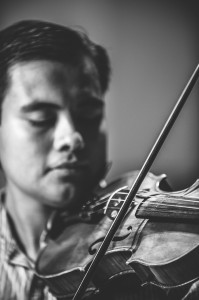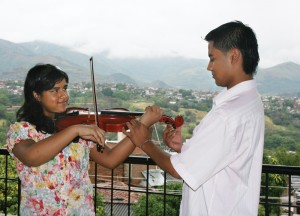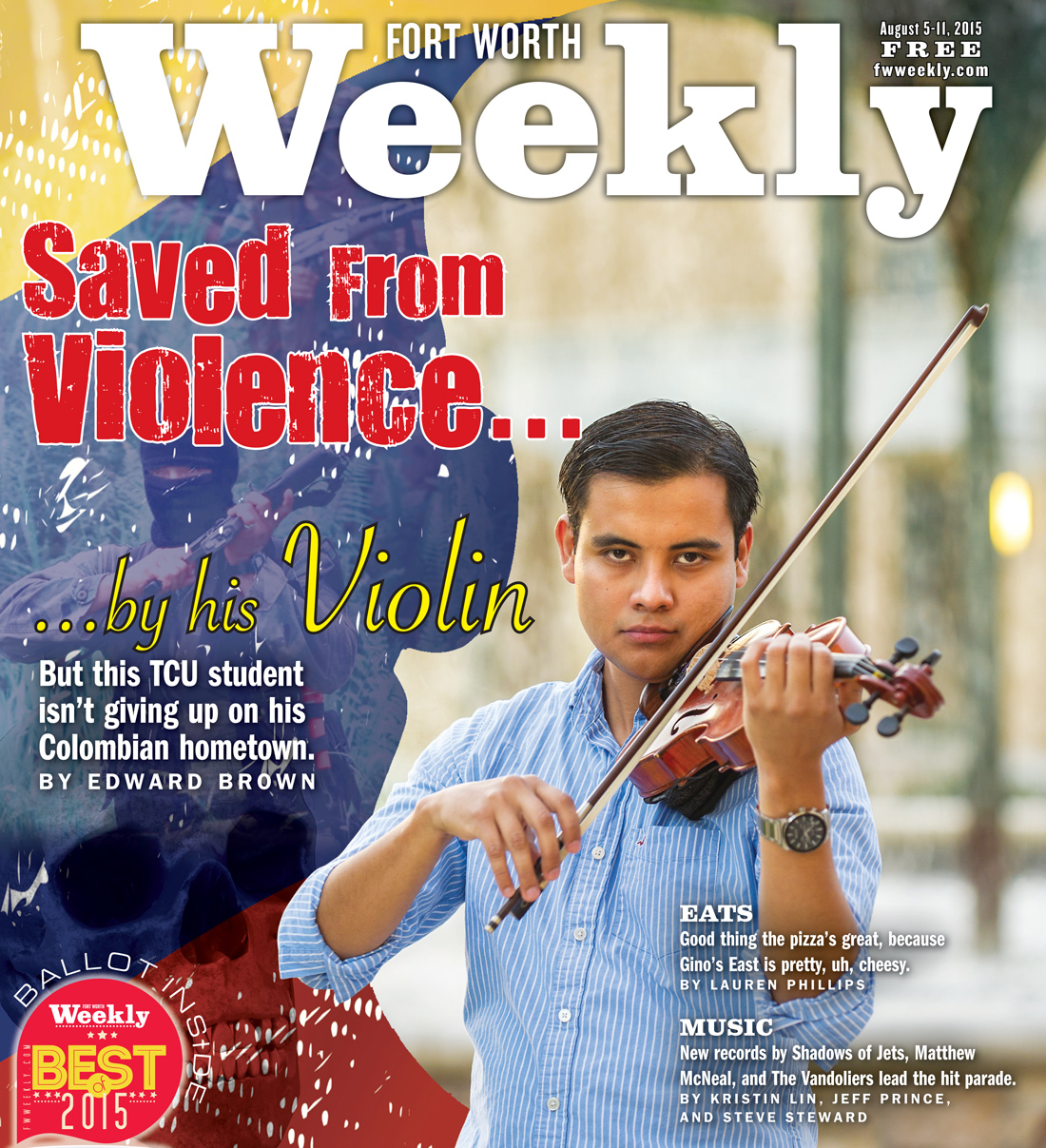The odds were stacked against Edinson Moreno.
Growing up in Siloe, a notorious neighborhood in the even more notorious city of Santiago de Cali, Colombia, the now 26-year-old witnessed violence almost daily. From seemingly endless fighting among gangs and drug traffickers, murder rates topped 2,000 annually. With 105 different gangs among the population of about 2 million, Cali, as it’s known, is considered the ninth most dangerous city in the world by the Council for Public Safety and Criminal Justice, a Mexican think tank.
But his years in Cali seem like two lifetimes ago. Now he spends his days in the tony environs of TCU. Moreno is set to graduate with a degree in violin performance this fall, and he hopes to become a permanent U.S. resident someday.
“I’ve had so many people help me,” he said. “If it weren’t for them, I wouldn’t be here.”
But how did he escape Cali?
With a musical instrument.

If not for his violin, Moreno said, he would be “dead or making a living with guns.”
TCU faculty member Elisabeth Adkins said Moreno’s talent is evident.
“He loves the violin,” she said. “He is a thoughtful and committed musician and pursues a deeply expressive voice on his instrument.”
Plus, she added, he is “charming in person, and he successfully translates that charm to his musicmaking.”
******

Santiago de Cali lies near the Pacific Ocean and is the largest city in southwestern Colombia. More than 2,000 young Cali residents were actively involved in gang activity in 2013, according to InSite Crime, a foundation that tracks and analyzes crime statistics across North, Central, and South America.
Moreno was never involved in illegal activities, but, he said, many of his friends were.
When he was 11, he was shocked to learn that a close friend with whom he had just visited had been murdered.
“Wait,” Moreno recalled thinking. “I was talking to him just last night. How is this possible?”
The boy was shot.
A few years later, another friend of Moreno’s was shot and killed in broad daylight in front of him.
Moreno’s Siloe neighborhood is constantly being torn apart by turf wars. Rather than risk their own lives or put friends in harm’s way, the drug dealers often pay kids to kill competitors.
“A child is easy to convince,” Moreno said. “The drug dealer can give them $50 to go and do this. [The kids] need the money. It’s a cycle that never goes away.”
Moreno’s path toward a full scholarship at TCU began in 1995. That’s when he was 7 years old and offered violin lessons by an influential Colombian musician.
The conduit between Moreno and Liliana Arboleda, a violinist with the Cali Philharmonic Orchestra, was Moreno’s mother. Raising her only child on her own, Maria earned $150 a month by working as a housekeeper for the Arboleda family –– in a much different part of town.
The gated community where the Arboledas lived was more than just a safe place for young Moreno. It became like a second home.
Inspired by the Suzuki method, a listening-based approach to music education developed by Shinichi Suzuki in the early 20th century, Arboleda and sister Claudia, a pianist, co-founded The Arboleda Suzuki School of Music in the late 1990s. Moreno was one of the original students.
Under the leadership of the Arboleda sisters, the school had already developed a high reputation when Moreno enrolled. The class gave Moreno his first experience hearing classical music. “It was something strange to me,” he said. “In my neighborhood I was only exposed to folk and popular music, and I had never had the opporutnity to try an instrument. I was surprised by how well-behaved the students in the music class were.”
Arboleda had seen music changes lives, she said. One of her close friends overcame childhood poverty to play in a Colombian orchestra. So when her family took on Maria, Arboleda saw an opportunity. Maria quickly agreed.
The lessons were helping her son in more practical ways. The time away from Siloe meant time away from the life of crime that was slowly ensnaring his friends. Now he was spending only mornings and nights in his neighborhood. His time at the Suzuki school, surrounded by rich, well educated families, allowed him to see a very different future than the one laid out for him by Siloe’s gangs.
Moreno completed the lesson books so quickly that some of his classmates’ parents began paying him to sit next to and practice alongside their children.
“I thought that he would be able to be as good as he wanted to be,” Arboleda recalled. “He had the discipline to accomplish whatever he wanted in life. He also had the support of everyone around him, including the children at the academy whom he had won over with his charisma. They supported him even though they came from different economic backgrounds.”
Moreno enjoyed being surrounded by wealth and beauty.
“Everyone looked so nice,” he said, “and they didn’t use weapons.”
“The truth is that without knowing it, the violin class became a lesson in life,” Arboleda said. “We took advantage of each lesson to talk about behavior, the importance of dreaming of a better future, and the power to accomplish big dreams.”
Inspired by Moreno’s success and realizing that there were thousands of other talented but underprivileged students in Cali, Arboleda began volunteering, teaching underprivileged children at Parroquia los Cristales en Bellavista. Moreno, though only 11 years old, and several other students from the academy gladly joined her. The only problem is that Arboleda and company did not have enough financial resources.
“The pastor suggested that I create a foundation [so we would] be able to continue the work we had started,” Arboleda said.
Arboleda applied for and was awarded a grant from the Suzuki Institute of Colorado, which allowed her and her sister to create Fundarboledas. The foundation now offers lessons to 90 underprivileged Cali children.
******













May GOD bless her.
Same outstanding as famous Rolling Stone or our polish magazine affiliated within not the biggest company ABSonic, but I love those music books to play very, very much …
This young man is our personal friend.
Thanks for great article